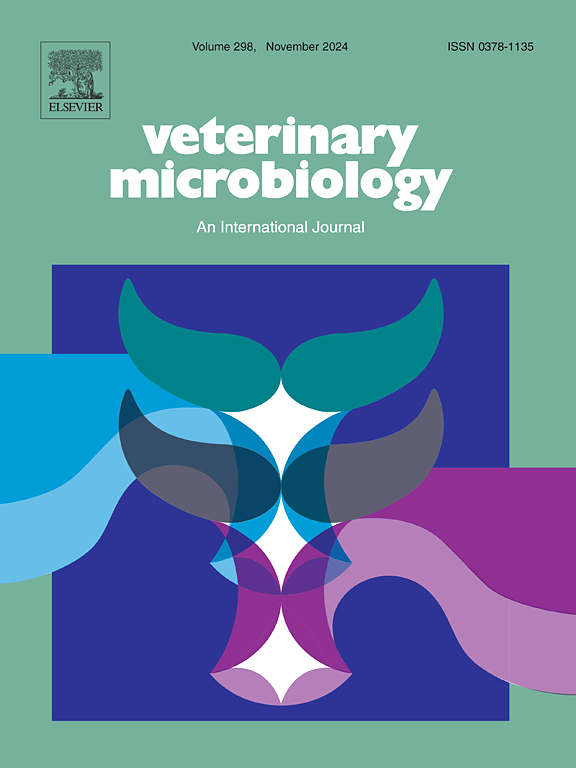BTG3 inhibits porcine epidemic diarrhea virus replication by promoting viral S2 protein degradation through the autophagy and proteasome pathways
IF 2.4
2区 农林科学
Q3 MICROBIOLOGY
引用次数: 0
Abstract
BTG3, which belongs to the BTG/Tob gene family, is involved in various physiological processes. Infection with porcine epidemic diarrhea virus (PEDV), an alphacoronavirus, is associated with high mortality rates among piglets, contributing to major economic losses. This study elucidated a novel mechanism through which BTG3 suppresses PEDV replication. Endogenous BTG3 protein expression was upregulated in PEDV-infected host cells. PEDV replication was suppressed upon BTG3 overexpression but enhanced upon BTG3 knockdown. Additionally, BTG3 inhibited viral proliferation by targeting and degrading the S2 subunit of the PEDV spike (S) protein through both autophagy and proteasome pathways. BTG3 interacted and co-localized with the S2 protein, promoting S2 protein degradation through the recruitment of the cargo receptor NDP52 and the E3 ubiquitin ligase MARCHF8. In summary, this study elucidated a novel antiviral mechanism in which the host BTG3 targeted the viral S2 protein to inhibit PEDV proliferation through autophagy and proteasome pathways. These findings indicate that BTG3 is a potential novel target for the prevention and control of PEDV.
求助全文
约1分钟内获得全文
求助全文
来源期刊

Veterinary microbiology
农林科学-兽医学
CiteScore
5.90
自引率
6.10%
发文量
221
审稿时长
52 days
期刊介绍:
Veterinary Microbiology is concerned with microbial (bacterial, fungal, viral) diseases of domesticated vertebrate animals (livestock, companion animals, fur-bearing animals, game, poultry, fish) that supply food, other useful products or companionship. In addition, Microbial diseases of wild animals living in captivity, or as members of the feral fauna will also be considered if the infections are of interest because of their interrelation with humans (zoonoses) and/or domestic animals. Studies of antimicrobial resistance are also included, provided that the results represent a substantial advance in knowledge. Authors are strongly encouraged to read - prior to submission - the Editorials (''Scope or cope'' and ''Scope or cope II'') published previously in the journal. The Editors reserve the right to suggest submission to another journal for those papers which they feel would be more appropriate for consideration by that journal.
Original research papers of high quality and novelty on aspects of control, host response, molecular biology, pathogenesis, prevention, and treatment of microbial diseases of animals are published. Papers dealing primarily with immunology, epidemiology, molecular biology and antiviral or microbial agents will only be considered if they demonstrate a clear impact on a disease. Papers focusing solely on diagnostic techniques (such as another PCR protocol or ELISA) will not be published - focus should be on a microorganism and not on a particular technique. Papers only reporting microbial sequences, transcriptomics data, or proteomics data will not be considered unless the results represent a substantial advance in knowledge.
Drug trial papers will be considered if they have general application or significance. Papers on the identification of microorganisms will also be considered, but detailed taxonomic studies do not fall within the scope of the journal. Case reports will not be published, unless they have general application or contain novel aspects. Papers of geographically limited interest, which repeat what had been established elsewhere will not be considered. The readership of the journal is global.
 求助内容:
求助内容: 应助结果提醒方式:
应助结果提醒方式:


